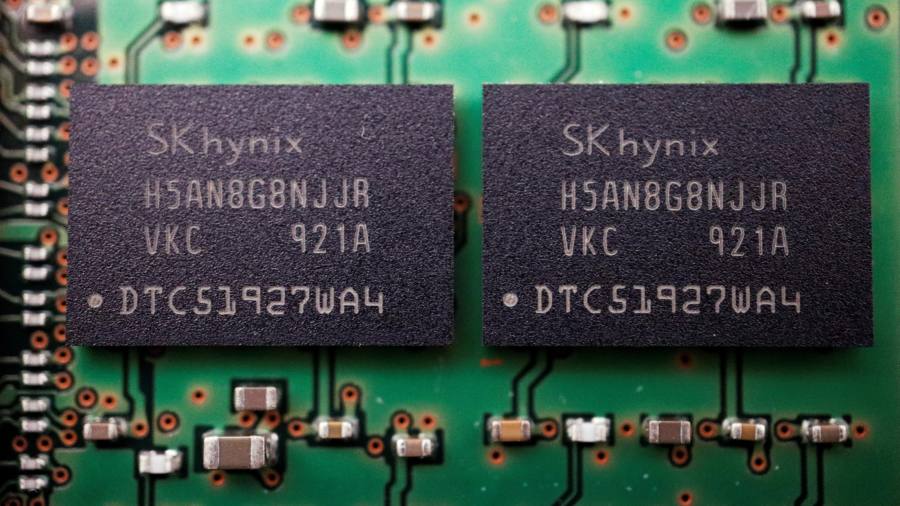
SK Hynix has called US efforts to limit technology exports to China “painful” as it slashes capital spending over the next year to battle “unprecedented” slowing demand for chips used in electronics.
The South Korean chipmaker on Wednesday cut its 2023 capital expenditure by more than 50 per cent after reporting a 60 per cent drop in third-quarter operating profit due to higher inflation and sluggish global growth, missing market expectations.
SK Hynix said it expected difficulties upgrading its plant in Wuxi, China, as a result of Washington’s latest export controls targeting China’s semiconductor industry. The Wuxi plant accounts for nearly half of SK Hynix’s production of D-Ram chips used in computers, smartphones and servers.
“Recently, a lot of geopolitical issues are affecting our business decision-making and the related restrictions are painful to us,” Noh Jong-won, the company’s president, told analysts during a conference call.
The South Korean manufacturer followed rivals including US-based Micron Technology and Japan’s Kioxia Holdings in cutting production after memory chip prices slid about 20 per cent in the third quarter.
SK Hynix said it would gradually reduce output starting with lower-margin products, as the industry confronted “an unprecedented deterioration in market conditions”.
The move comes after the company’s third-quarter operating profit fell to Won1.7tn ($1.2bn), missing analyst estimates of Won1.87tn, according to Refinitiv. Third-quarter revenue fell 7 per cent to Won11tn.
Shares of SK Hynix rose as much as 2 per cent on Wednesday as investors went bargain hunting. The stock is still down 27 per cent year to date.
Along with TSMC, the world’s largest chipmaker, SK Hynix was granted a one-year exemption from the US restrictions, allowing them to bring some new equipment into Chinese factories without Washington’s approval.
SK Hynix said it expected to receive a yearly extension of the temporary waiver but warned it would struggle to bring the most cutting-edge technology into China. “It will not be easy for us to bring EUV [extreme ultraviolet lithography] equipment into the Wuxi factory,” said Noh.
He did not expect the difficulties to cause “critical trouble” for the company’s Chinese operations until the late 2020s but said they could still drive up production costs.
Noh added that growing geopolitical risks made diversifying its production bases “essential” in the long term but admitted it would not be easy to adjust them immediately.
He said the company was making contingency plans for a worst-case scenario. “In the extreme situation where we can no longer operate the Wuxi plant, we can sell off the fab or the equipment or bring the equipment to Korea,” he said.
Analysts expect the Wuxi factory’s competitiveness to significantly weaken in two to three years if SK Hynix cannot ship EUV machines to China.
“The US basically doesn’t want to see cutting-edge chips produced in China using EUV machines. It wants to see more of such an advanced chip production done in the US,” said Kim Young-woo, head of research at SK Securities.
“The Wuxi plant will lose its competitiveness without EUV machines, against Samsung and Micron Technology.”